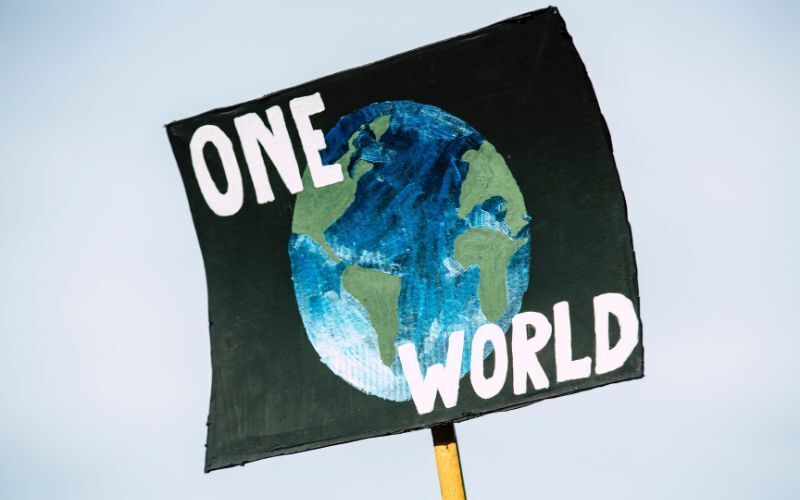Photo by Markus Spiske on Unsplash

Agosín, Marjorie. Women, Gender, and Human Rights: A Global Perspective. Rutgers University Press; 1 edition (September 1, 2001).
Women, Gender, and Human Rights is the first collection of essays that encompass a global perspective on women and a wide range of issues, including political and domestic violence, education, literacy, and reproductive rights. Most of the articles were written expressly for this volume by internationally known experts in the fields of government, bioethics, medicine, public affairs, literature, history, anthropology, law, and psychology.
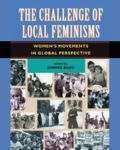
Basu, Amrita. The Challenge Of Local Feminisms: Women's Movements In Global Perspective (Social Change in Global Perspective). Westview Press; First Edition edition (July 19, 1995).
This pathbreaking book provides for the first time an overview of the genesis, growth, gains, and dilemmas of women’s movements worldwide. Unlike most of the literature, which focuses on the industrialized Western world, this volume devotes greater attention to the postcolonial states of Asia, Africa, and Latin America. The book challenges the assumptions that feminism can transcend national differences and, conversely, that women’s movements are shaped and circumscribed by national levels of development. All the authors reject the notion, proposed by its detractors and champions alike, that feminism is of middle-class origins and Western inspiration. Instead they seek to locate women’s movements within the terrain from which they emerge.Virtually all the authors are from the countries or communities about which they write; the few exceptions are women who have spent lengthy periods studying and living in the region. Most are scholars, often in women’s studies, and many are closely associated with the movements they describe. Thus, these writers share a commitment to the substantive concerns as well as the collective processes of women’s movements. As a key book for the Fourth World Conference on Women in Beijing, this volume will be essential reading for anyone interested in the global scope and implications of feminism.
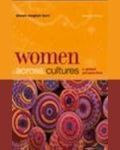
Burn, Shawn Meghan. Women Across Cultures: A Global Perspective. McGraw-Hill Education; 3rd edition (August 30, 2010).
Women Across Cultures examines contemporary women's issues and empowerment from a global perspective. Gender inequality is examined as a historical, sociocultural phenomenon within the context of interlocking systems of inequality such as racism, colonialism, and economic injustice. A strong emphasis is given to the variety of approaches and actions women take to promote gender equality and to influence women's progress. The influence of intersectional and contextual factors on women's issues, activism, and movements are a key focus.
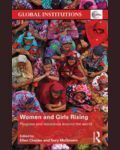
Chesler, Ellen and McGovern, Terry. Women and Girls Rising: Progress and resistance around the world (Global Institutions). Routledge (July 2, 2015).
A growing body of evidence demonstrates that improvements in the status of women and girls – however worthy and important in their own right – also drive the prosperity, stability, and security of families, communities, and nations. Yet despite many indicators of progress, women and girls everywhere – including countries of the developed world – continue to confront barriers to their full and equal participation in social, economic, and political life.
Capturing voices and experiences from around the world, this work documents the modern history of the global women’s movement - its many accomplishments and setbacks. Drawing together prominent pioneers and contemporary policymakers, activists, and scholars, the volume interrogates where and why progress has met resistance and been slowed, and examine the still unfinished agenda for change in national and international policy arenas. This history and roadmap are especially critical for younger generations who need a better understanding of this rich feminist legacy and the intense opposition that women’s movements have generated.
This book creates a clear and forceful narrative about women’s agency and the central relevance of women’s rights movements to global and national policy-making.. It is essential reading for activists and policymakers, students and scholars alike.
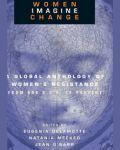
DeLamotte, Eugenia C. and Meeker, Natania. Women Imagine Change: A Global Anthology of Women's Resistance from 600 B.C.E. to Present. Routledge; 1 edition (September 19, 1997).
This global, multicultural anthology shows how women from some thirty countries, across twenty-six centuries, have found ways to resist oppression and gain power over their lives. Organized around themes of concern to contemporary readers, Women Imagine Change explores: relationships between women's sexuality and spirituality; women's interlinked struggles to control their labor and education; their work reshaping representations of gender; and their varied translations of knowledge into power. Extensive introductions combine a broad theoretical perspective on gender and resistance with vivid biographical context.
Not only do the writings show women's resistance from an historical perspective; they also offer crucial insight into questions women are posing today about the relationships between their own power, the power of the various groups to which they belong, and the larger systems of power they confront in the world around them.
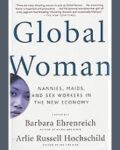
Ehrenreich, Barbara and Hochschild, Arlie Russell. Global Woman: Nannies, Maids, and Sex Workers in the New Economy. Metropolitan Books; 2004.
In a remarkable pairing, two renowned social critics offer a groundbreaking anthology that examines the unexplored consequences of globalization on the lives of women worldwide.
Confronting a range of topics, from the fate of Vietnamese mail-order brides to the importation of Mexican nannies in Los Angeles and the selling of Thai girls to Japanese brothels, Global Woman offers an unprecedented look at a world shaped by mass migration and economic exchange on an ever-increasing scale. In fifteen vivid essays-- of which only four have been previously published-- by a diverse and distinguished group of writers, collected and introduced by bestselling authors Barbara Ehrenreich and Arlie Russell Hochschild, this important anthology reveals a new era in which the main resource extracted from the third world is no longer gold or silver, but love.
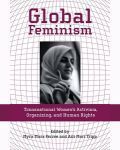
Ferree, Myra Marx and Tripp, Aili Mari. Global Feminism: Transnational Women's Activism, Organizing, and Human Rights. NYU Press (July 1, 2006).
Increasingly feminists around the world have successfully campaigned for recognition of women's full personhood and empowerment. Global Feminism explores the social and political developments that have energized this movement. Drawn from an international group of scholars and activists, the authors of these original essays assess both the opportunities that transnationalism has created and the tensions it has inadvertently fostered. By focusing on both the local and global struggles of today's feminist activists this important volume reveals much about women's changing rights, treatment and impact in the global world. Contributors: Melinda Adams, Aida Bagic, Yakin Erturk, Myra Marx Ferree, Amy G. Mazur, Dorothy E. McBride, Hilkka Pietil, Tetyana Pudrovska, Margaret Snyder, Sarah Swider, Aili Mari Tripp, Nira Yuval-Davis.

Ford, Tanisha. Liberated Threads: Black Women, Style, and the Global Politics of Soul (Gender and American Culture). The University of North Carolina Press (September 14, 2015).
In this thought-provoking book, Tanisha C. Ford explores how and why black women in places as far-flung as New York City, Atlanta, London, and Johannesburg incorporated style and beauty culture into their activism. Focusing on the emergence of the "soul style" movement—represented in clothing, jewelry, hairstyles, and more—Liberated Threads shows that black women's fashion choices became galvanizing symbols of gender and political liberation. Drawing from an eclectic archive, Ford offers a new way of studying how black style and Soul Power moved beyond national boundaries, sparking a global fashion phenomenon. Following celebrities, models, college students, and everyday women as they moved through fashion boutiques, beauty salons, and record stores, Ford narrates the fascinating intertwining histories of Black Freedom and fashion.
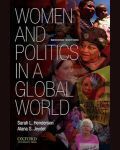
Henderson, Sarah L. and Jeydel, Alana S. Women and Politics in a Global World. Oxford University Press; 3 edition (July 15, 2013).
Women and Politics in a Global World, Third Edition, is the only text that offers a cross-national and comparative examination of the impact of women on politics--and the impact of politics on women. Sarah L. Henderson and Alana S. Jeydel carefully consider women's participation in institutionalized politics, social protest, and nationalist, fundamentalist, and revolutionary movements.
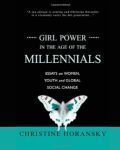
Horansky, Christine. Girl Power in the Age of the Millennials: Essays on Women, Youth and Global Social Change. Ivy & Airwaves (March 6, 2014).
Young women are not just changing the world. They are changing public perception of what leadership looks like in the 21st century. In this collection of essays, Huffington Post blogger Christine Horansky explores what it means to be a young woman living at the frontier of a brave new age. She writes from a Millennial perspective on international development, education policy, and the global advancement of women and girls. With expert insight and moving personal narrative, she chronicles a rising generation that together is writing a new chapter in history, from the classroom to the media to the halls of power.

James, Carolyn Custis. Half the Church: Recapturing God's Global Vision for Women. Zondervan (June 2, 2015).
The lives of twenty-first century women are varied and complex, ranging from seemingly limitless opportunities to grinding poverty and shocking atrocities. In a world that begs the question “Is God good for women?” the church must convey God’s good news for all women in a robust and relevant way.
But too often the church’s message for women is not big enough to address the opportunities, changes, and contingencies of life in a fallen world. Dominant messages for women in our world today arise from the voices of radical feminism or fundamentalist Islam. God’s Word offers an empowering and positive message that mobilizes all women, regardless of age, stage of life, social status, or country, and calls them to join their brothers in a Blessed Alliance to advance God’s gracious kingdom on earth.
Carolyn James unpacks three key biblical images of God’s vision for women―directly, clearly, and from a global perspective―so that no woman or girl is left behind.
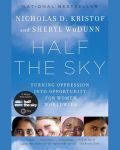
Kristof, Nicholas D. and WuDunn, Sheryl. Half the Sky: Turning Oppression into Opportunity for Women Worldwide. Vintage; 1 edition (August 22, 2009).
From two of our most fiercely moral voices, a passionate call to arms against our era’s most pervasive human rights violation: the oppression of women and girls in the developing world.
With Pulitzer Prize winners Nicholas D. Kristof and Sheryl WuDunn as our guides, we undertake an odyssey through Africa and Asia to meet the extraordinary women struggling there, among them a Cambodian teenager sold into sex slavery and an Ethiopian woman who suffered devastating injuries in childbirth. Drawing on the breadth of their combined reporting experience, Kristof and WuDunn depict our world with anger, sadness, clarity, and, ultimately, hope.
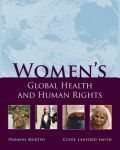
Murthy, Padmini and Smith, Clyde Lanford. Women's Global Health And Human Rights. Jones & Bartlett Learning; 1 edition (April 1, 2009).
Women's Global Health and Human Rights serves as an overview of the challenges faced by women in different regions of the world. Ideal as a tool for both professionals and students, this book discusses the similarities and differences in health and human rights challenges that are faced by women globally. Best practices and success stories are also included in this timely and important text. Major Topics include:Globalization, Gender Based Terrorism and Violence, Cultural Practices, Health Problems, Progress and Challenges.

Ngai, Pun. Made in China: Women Factory Workers in a Global Workplace. Duke University Press Books; Revised edition (April 5, 2005).
As China has evolved into an industrial powerhouse over the past two decades, a new class of workers has developed: the dagongmei, or working girls. The dagongmei are women in their late teens and early twenties who move from rural areas to urban centers to work in factories. Because of state laws dictating that those born in the countryside cannot permanently leave their villages, and familial pressure for young women to marry by their late twenties, the dagongmei are transient labor. They undertake physically exhausting work in urban factories for an average of four or five years before returning home. The young women are not coerced to work in the factories; they know about the twelve-hour shifts and the hardships of industrial labor. Yet they are still eager to leave home. Made in China is a compelling look at the lives of these women, workers caught between the competing demands of global capitalism, the socialist state, and the patriarchal family.

Parrot, Andrea and Cummings, Nina. Forsaken Females: The Global Brutalization of Women. Rowman & Littlefield Publishers (June 8, 2006).
Women around the world routinely suffer from beatings, rape, torture and murder. These are not the practices of a few demented individuals, but are often institutionalized, culturally-sanctioned behaviors. Millions of women live in a constant state of isolation, terror and fear; for most, escape is nearly impossible due to economic, social, or cultural restrictions. Forsaken Females describes the many types of global brutalization that occur against women: including feticide, infanticide, female genital mutilation, sexual slavery, honor killing, acid attacks, trafficking, dowry death, rape, and intimate partner violence. The violence is varied in both method and practice and is often supported by patriarchal ideologies or policies that maintain the social conditions and cultural framework that accept women's brutalization.
Forsaken Females also addresses the physical, emotional and economic impact of the violence. The discussion is structured around the experiences of women who describe their personal victimization. Each chapter concludes with examples of promising policies and practices developed to address and reduce violence perpetrated against women.

Paxton, Pamela and Hughes, Melanie M. Women, Politics, and Power: A Global Perspective (Third Edition) (Sociology for a New Century Series). CQ Press; March 6, 2014
Women, Politics, and Power: A Global Perspective offers a clear, detailed introduction to women's political participation and representation across a wide range of countries and regions. This third edition includes more than 100 new studies from the rapidly expanding field of gender and politics.
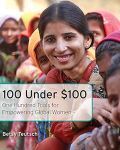
Teutsch, Betsy. 100 Under $100: One Hundred Tools for Empowering Global Women. She Writes Press (March 6, 2015)
100 Under $100: One Hundred Tools for Empowering Global Women is a comprehensive look at effective, low-cost solutions for helping women in the Global South out of poverty. Most books on this subject focus on one problem and one solution; author Betsy Teutsch instead spreads her net wide, sharing one hundred successful, proven paths out of poverty in eleven different sectors—including tech, public health, law, finance, and more—in a visually striking book full of images of vibrant, strong women farmers, health practitioners, entrepreneurs, and humanitarian tech stars doing exciting, cutting-edge work.
Eye-opening and compelling, 100 Under $100 is an accessible entry point for globally-attuned readers excited about using a broad range of tools to empower women and help alleviate poverty in the developing world.
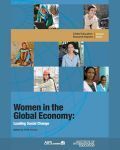
Tierney, Trish. Women in the Global Economy: Leading Social Change. Institute of International Education (March 21, 2013).
Some leaders are born women, former Secretary of State Hillary Clinton said at the groundbreaking APEC Women and the Economy Summit in San Francisco in Sept. 2011. Women leaders can be found driving change through political movements, emerging market growth, or grassroots activism, yet their stories are not always highlighted. This book reviews the transformation that has taken hold in recent years -- the collective recognition that investing in women is not only smart, it also delivers high impact social and economic returns, and is critical to the global economy.

Worden, Minky and Amanpour, Christiane. The Unfinished Revolution: Voices from the Global Fight for Women's Rights. Seven Stories Press (March 6, 2012).
The Unfinished Revolution tells the story of the global struggle to secure basic rights for women and girls, including in the Middle East where the Arab Spring raised high hopes, but the political revolutions are so far insufficient to guarantee progress. Around the world, women and girls are trafficked into forced labor and sex slavery, trapped in conflict zones where rape is a weapon of war, prevented from attending school, and kept from making deeply personal choices in their private lives, such as whom and when to marry. In many countries, women are second-class citizens by law. In others, religion and traditions block freedoms such as the right to work, study or access health care. Even in the United States, women who are victims of sexual violence often do not see their attackers brought to justice.
More than 30 writers—Nobel Prize laureates, leading activists, top policymakers, and former victims—have contributed to this anthology. Drawing from their rich personal experiences, they tackle some of the toughest questions and offer bold new approaches to problems affecting hundreds of millions of women. This volume is indispensable reading, providing thoughtful analysis from a never-before assembled group of advocates. It shows that the fight for women’s equality is far from over. As Leymah Gbowee, 2011 Nobel Peace Prize Laureate says, “Women are not free anywhere in this world until all women in the world are free.”

